Ron Howard on Career Highs, Self-Doubts and ‘Hillbilly Elegy’ Author J.D. Vance: “I Was Surprised by Some of the Positions He’s Taken”

In April, one of America’s most famous directors, Ron Howard, called The Hollywood Reporter to follow up. He said he wanted to provide additional color to an answer that he gave about his recent film, Hillbilly Elegy, during an hourlong interview the day before.
“You were asking a couple of questions about J.D. Vance and how I felt about it, and, you know, I hadn’t actually addressed it or talked to anybody about it very much,” says Howard about the conservative best-selling author whose memoir his 2020 film is based on — and who just won the Ohio Senate Republican primary. “It took me a minute to go back and put it all in context.” Phoning again from his full-time home in Connecticut to delve into a tough question (more on this later) reflects how Howard has been known in Hollywood over his 60-plus-year career: thoughtful and conscientious, not to mention one of the most successful filmmakers of the 20th and 21st centuries, whose movies as a director have grossed more than $4.3 billion globally and have won about 40 film awards, with A Beautiful Mind garnering four Oscars.
More from The Hollywood Reporter
Howard’s work also has had a lasting cultural impact: Over the past four decades, movies like Splash, Apollo 13 and A Beautiful Mind have become staples of American cinema and also helped define American culture globally. Since 2012, Howard, now 68, has solidified himself, quietly, as a documentarian, with films like Made in America, Pavarotti, Rebuilding Paradise and, as of May 27, We Feed People.
But his career started in front of the camera: Before he was 10 years old, Howard was the star of the hit TV series The Andy Griffith Show and of movies like 1962’s The Music Man. It was on Andy Griffith that his interest in filmmaking took hold. “I was curious about the camera, I loved listening to the writers talk about rewrites, and I began to see that almost all of our directors had been actors first, among them the great comedy star Howard Morris, who was also an excellent director,” Howard tells THR. “When I was about 10, he said, ‘I see you looking around, asking questions. I’ll bet you wind up being a director.’ ”
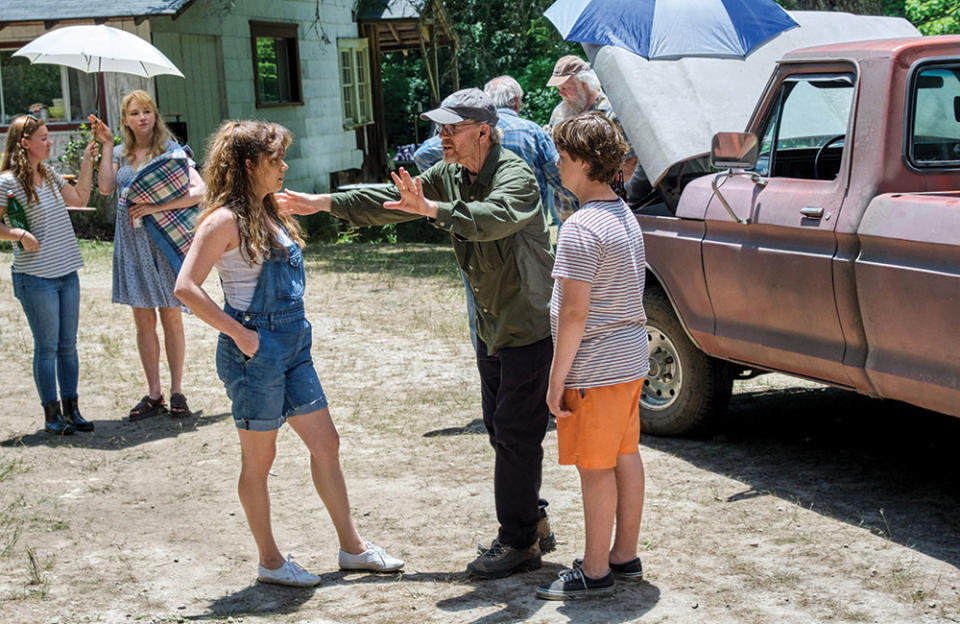
Courtesy of Lacey Terrell/Netflix/Everett Collection
Thirteen years later, in 1977, Howard would helm Grand Theft Auto (no relation to the video game), his directorial debut that he wrote alongside his father, Rance Howard. “The very first day of filming my first movie for [executive producer] Roger Corman, I thought I was going to be fired,” Howard says, laughing. “I was in the movie, and I had co-written it, but I thought I could be fired because I was behind schedule and Roger Corman was infamous for staying on budget and schedule. But I made it through that day, and within a couple days, I really had my stride and I loved it. From that point on, I thought of myself as a director.”
Fast forward to 1978 — with Howard having starred in 1973’s American Graffiti and then becoming a household name on the TV sensation Happy Days — the year he met a TV producer with whom he would partner to become one of the most powerful duos in Hollywood. Brian Grazer had just signed a deal to make movies and TV shows for Paramount. “I looked out my window [of my office on the lot], and I see Ron Howard from Happy Days,” Grazer tells THR. “I yelled out the window, ‘Ron Howard! Ron!’ and he dashed around the corner — I guess I scared him. I called him to my office because I had this practice of meeting a new person every week in the business. He was my target for that week.”
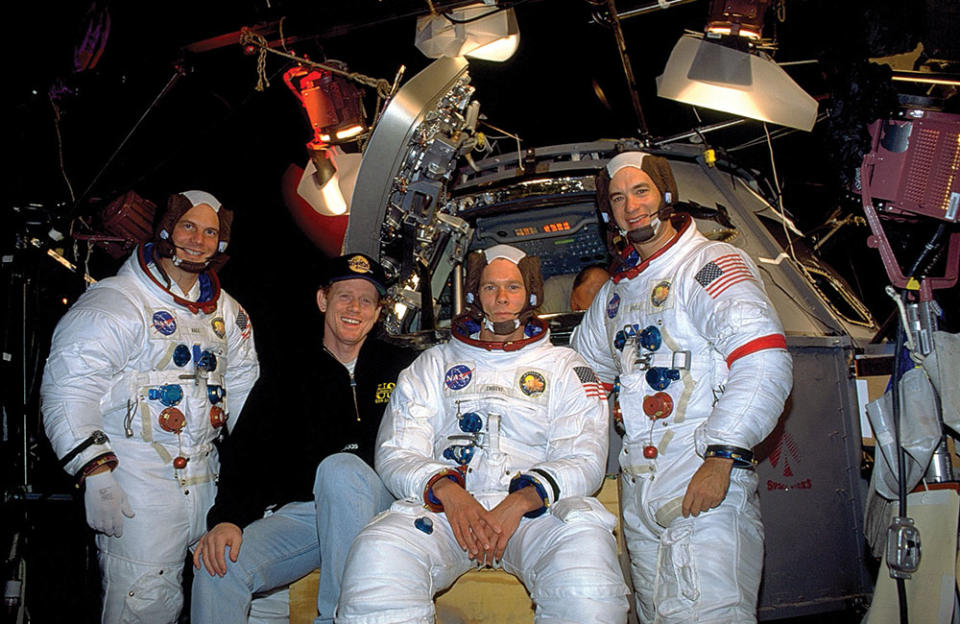
Courtesy of Universal/Everett Collection
Grazer pitched two films to Howard, Night Shift and Splash, the latter of which he had been working on for five years. “He and I had tremendous chemistry,” says the producer. “We had that creative and personal trust because starting a movie when you’re that young, there are a lot of things that can go wrong.
“He’s known as a star and an Oscar-winning director, but he’s really an artist,” says Grazer, adding that Howard’s decent demeanor can be misinterpreted. “The most important thing about Ron, he’s not one to ever underestimate. He’s incredibly kind and empathetic, all the things that we know, but it should never be construed as anything other than that. He’s very strong, polite but with dignity, has very strong points of view creatively, is very well informed on the history of film. He’s played in the big game and won.”
Howard credits the beginnings of his staggering success to Night Shift and to Splash, the latter of which “had been a very problematic project to get off the ground, and together, we were able to have an even more successful film and experience,” he says of the movie that grossed $69.8 million worldwide and made Tom Hanks and Daryl Hannah stars.
Following Splash, the duo in 1985 founded Imagine Entertainment, a production company that produced films like 2002’s 8 Mile, 2011’s J. Edgar and 2018’s The Spy Who Dumped Me as well as such early aughts TV shows as 24, Felicity and Arrested Development (not to mention its 2018 Netflix revival). In 2018, the company acquired a controlling stake in Jax Media (which produced Broad City, Younger and Inside Amy Schumer) and, in 2020, made a substantial investment in Alex Gibney’s Jigsaw Productions.
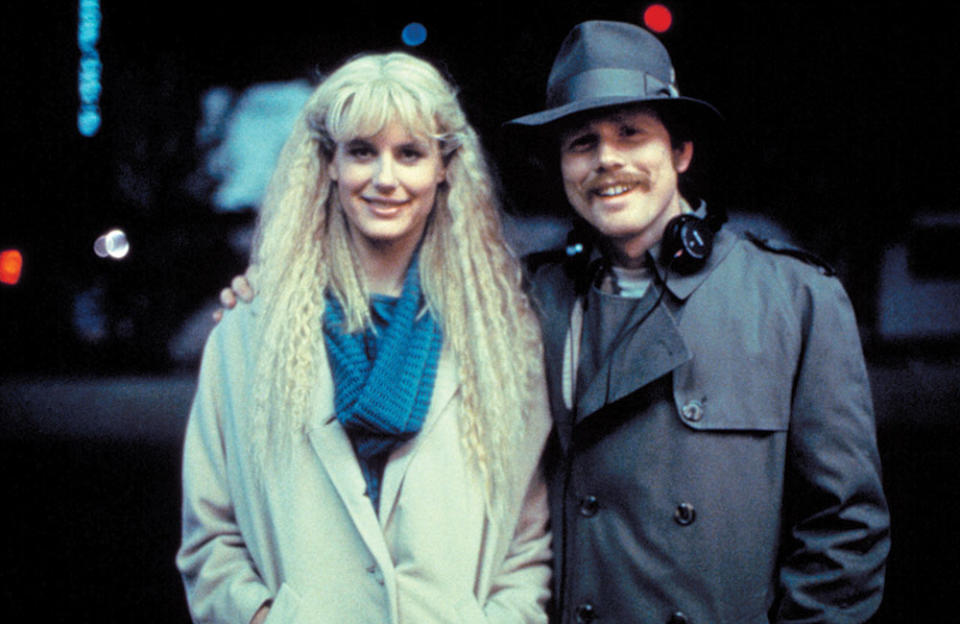
Courtesy of Touchstone Pictures/Everett Collection
“I had produced television movies where I would take financial risks and be the completion guarantor, which meant I was seeing my own money spent sometimes,” says Howard of his early sense of commitment. “I came out of television, which was a very rigid format, and as I fell in love with movies in the mid- to late-’60s, I followed people like Mike Nichols, Arthur Penn and Norman Jewison, who were not following formats, and I wanted to be one of those storytellers.”
That flexibility is baked into Imagine’s mission. “The original dream for Imagine was what it has grown into — a place where all the lines are blurred,” says Howard. “If you can work on a movie idea with Imagine, you — that same writer, director or star — can work on a television project that inspires you or a documentary or branded content. That’s what I always hoped for. Our company today reflects that entrepreneurial spirit of creatives who are businesslike but want to make those two objectives align as much as possible.”

Columbia/Courtesy Everett Collection
While Imagine was gaining momentum, so was Howard’s directing career. He went on to direct such popular and/or critical hits as Cocoon (1985); Willow (1988), now getting a TV series treatment at Disney+; Parenthood (1989); A Beautiful Mind (2001), which won Oscars for best picture, best supporting actress for Jennifer Connelly, best director for Howard and best adapted screenplay; The Da Vinci Code (2006), his highest-grossing film that made $760 million worldwide; Frost/Nixon (2008); Solo: A Star Wars Story (2018); and, up next, Thirteen Lives, based on the Thai cave rescue, set for a November release. More than 178.5 million people have watched a Ron Howard movie in North American theaters, based on average-ticket data from analytics firm EntTelligence.
Though Howard has been in the game for more than six decades, he’s not immune to negative reviews or criticism, he says. Hillbilly Elegy, for example, was panned by critics (with a 25 percent score on Rotten Tomatoes), but, as Howard himself notes, it received a much higher audience score of 83 percent — the first time there’s been such a gap for one of his films. “I used to avoid [reviews]. Now I don’t,” says Howard. “Because I want the collective feedback. Critics make up a very specific kind of audience, but they’re an audience. The really interesting thing was the discrepancy between critical response for Hillbilly Elegy and audience feedback. You see it happen a lot more with genre pictures, broad comedies and with some horror films, but I’ve never seen it like this with drama.”
Shortly after Hillbilly was released in 2020, the film was criticized for its idealized take on Vance’s up-by-his-bootstraps life story, with the film covering his Appalachian childhood up to his Yale Law years and ending before he became a venture capitalist, conservative commentator and a Donald Trump-endorsed Ohio senatorial candidate (following Vance backtracking on his criticisms of Trump during the 2016 presidential election). Howard notes he was “surprised by some of the positions [Vance has] taken and statements he’s made” after working with him on the film. Howard says he hasn’t spoken to Vance since the film’s release. “I always knew he was conservative, but [he] struck me as a very center-right, a kind of a moderate thinker,” says Howard. “It was a family drama based on real events. There was a lot that I personally related to about the family dynamics, but also the region, the sensibility that I had long been looking for a way to express through a story. It ended with him at Yale and wasn’t ever meant to suggest that he was headed in the direction of politics.”
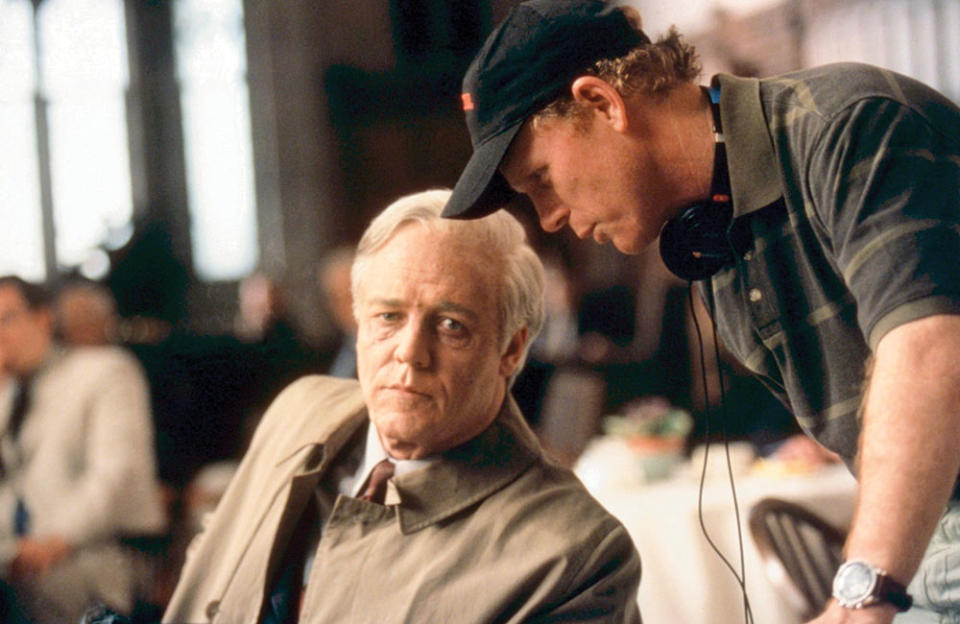
Universal/Courtesy Everett Collection
Howard also weathered disappointing box office returns for Solo: A Star Wars Story. Although it received generally favorable reviews, it grossed just $393.2 million worldwide, making it the lowest-grossing live-action Star Wars film in the franchise and the first to lose money for Disney. “There’s a lot I really love about Solo, and yet it didn’t hit the zeitgeist when it came to the market. Damn,” says Howard ruefully.
He took on Solo helming duties after the 2017 firing of Phil Lord and Chris Miller over “creative differences” with Lucasfilm head Kathleen Kennedy, when about 70 percent of the film was finished, and he felt he could help complete the movie to Lucasfilm’s — and fans’ — expectations. “I’ve been around Star Wars forever,” Howard says. “He didn’t have a title for it at the time, but while we were shooting American Graffiti, George Lucas described what he hoped his next movie would be. And he described Star Wars, and I’ve always been a fan, yet those projects take about three years, and it never made sense for me.”
Taking over for another director is a feat in itself, but taking over a Star Wars film more than halfway through is whole other battle. “I understood that this difference had created a schism to the point where they weren’t going to be able to go on working together, and that was really unfortunate because I like Phil and Chris, and I also really admire them. When I looked at the footage and read the script, which I liked, I felt like I understood what it was that the studio and Lucasfilm were looking for in finishing the movie and reshooting some of the movie, and in a few places, I thought of reconceiving a few scenes, which they were open to. I had some really comforting conversations with Phil and Chris, who let me know that they weren’t leaving because I was coming in. For me, it was an absolute exercise in professionalism and friendship, and it indirectly led to a season of Willow, which we’re doing now [with] Jonathan Kasdan.”
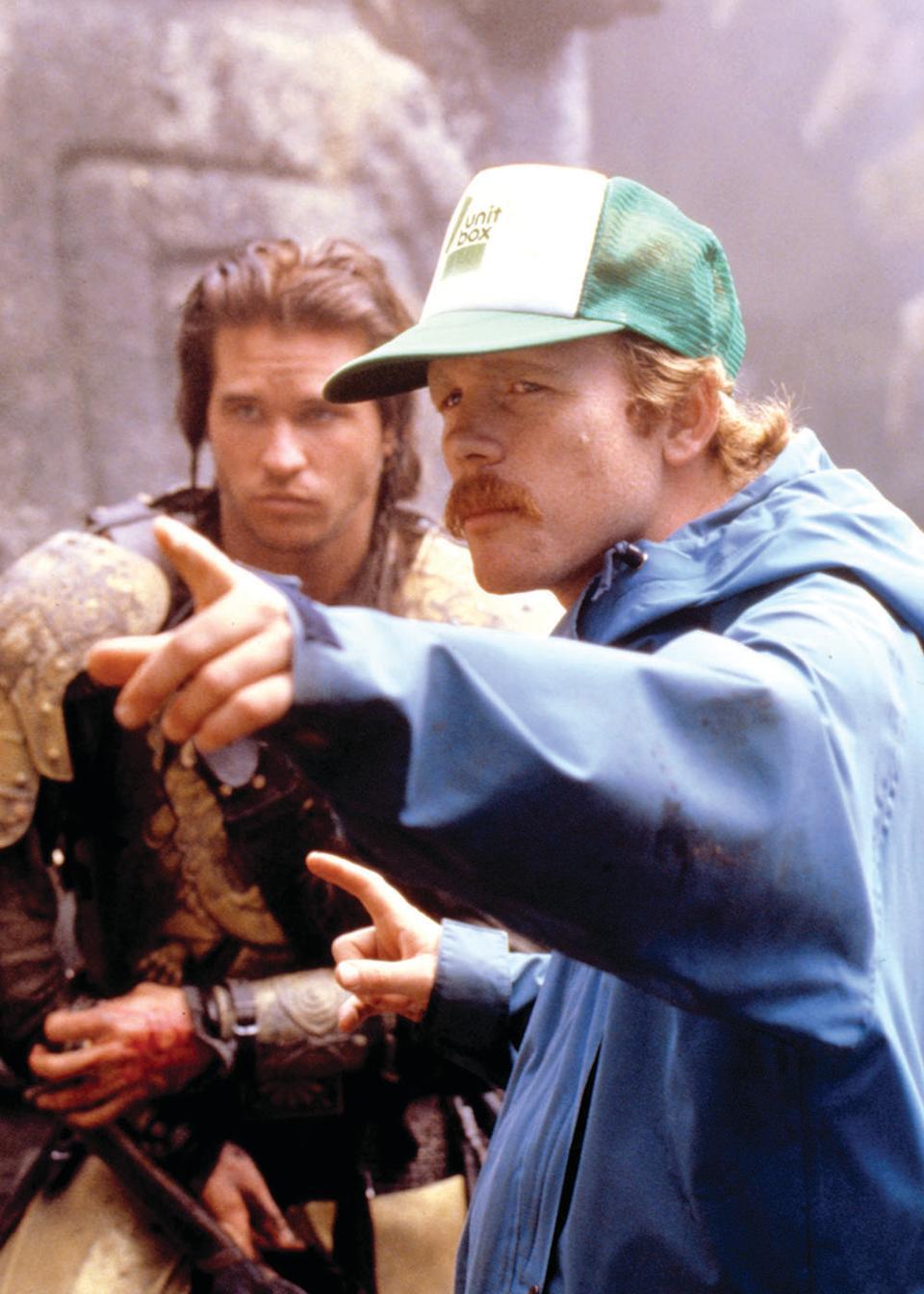
Courtesy MGM/Everett Collection
Willow is a 1988 dark fantasy drama that starred Warwick Davis, Val Kilmer and Joanne Whalley — an idea Lucas conceived in 1972. At the time, it was not the box office success many had expected but has since become a moneymaker due to international box office returns as well as home video and TV revenue. Willow being turned into a series (for Disney+) is something that Howard, an executive producer, says was always on Lucas’ mind but never came to fruition.
Unlike some in the industry who point to Netflix’s recent troubles with anxiety and glee, Howard speaks highly of streamers, in particular Disney+, which also is releasing We Feed People, about José Andrés’ nonprofit World Central Kitchen and its work feeding people made vulnerable by natural disasters and war. (Howard also has worked with Netflix frequently in recent years: Hillbilly Elegy was released in theaters Nov. 11, 2020, then on Netflix 13 days later. Films he’s produced or executive produced, like Tick, Tick … Boom!, also went to Netflix.) “I covet the big screen for many of the stories, but I don’t think it’s right for every story. I look at myself and my wife, Cheryl, our whole relationship has been built around going to the movies and, when we’re raising kids, date nights at the movies,” says the father of three daughters and a son. “But … stories need to find the format that best suits [them].”
Howard served as executive producer on his daughter’s directorial debut, the documentary Dads, which explores modern-day fatherhood. Bryce Dallas Howard (Jurassic World) grew up on set watching her father work. “He’s such a wonderful dad and a beautiful, devoted, hard-working, brilliant storyteller, and he doesn’t have a private persona and then a public persona. He’s just who he is,” says Bryce Dallas Howard. “He’s a quality human being, and [all his kids] feel that way. He’s been so inclusive with us with his work, but he also recognizes that not every one of us has the same level of interest in filming as he does, and he’s been just as interested in what we’re into.”
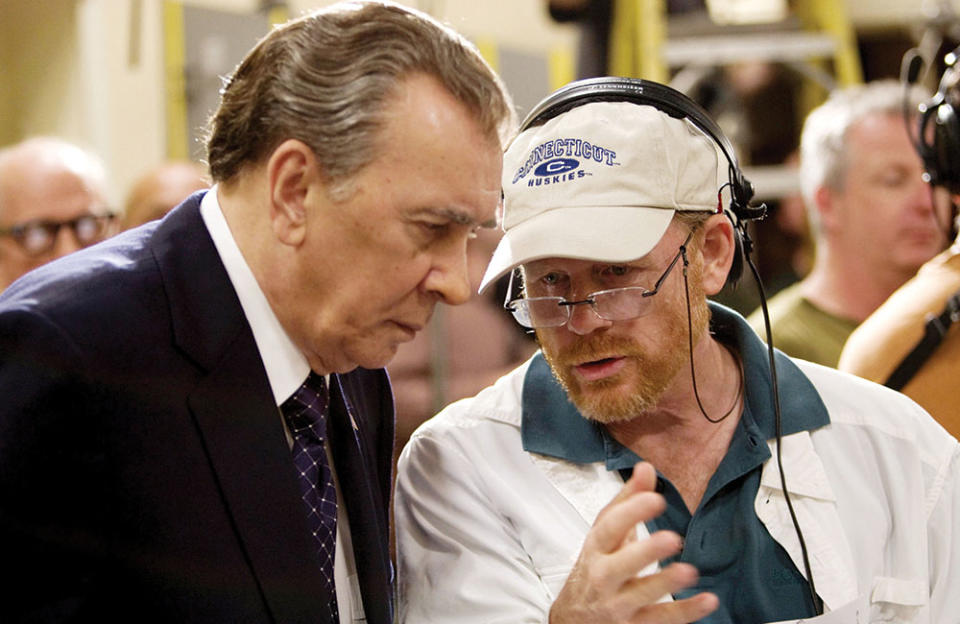
Courtesy of Universal/Courtesy Everett Collection
While she has been an extra in his earlier movies, Howard says he has never directed his daughter. “But every director loves working with her, so I think I might be robbing myself,” he says. “Also, she’s turned down a couple of things I’ve tried to offer her — she’s a busy lady.”
His words of wisdom to her when she showed interest in directing, he says, differed from advice he’d give other aspiring filmmakers: “My advice was about understanding her ambitions and helping her calibrate that and apply her foothold in front of the camera to what she was trying to accomplish behind the camera. She’s incredibly sophisticated in her understanding of what’s going on, fueled by this energy, and she and I are alike in this way, of loving what the medium can mean to people and what it feels like to be a part of the team that tells the story. She has no intention to give up.” And neither does he.
This story first appeared in the May 10 issue of The Hollywood Reporter magazine. Click here to subscribe.
Best of The Hollywood Reporter

 Yahoo News
Yahoo News 